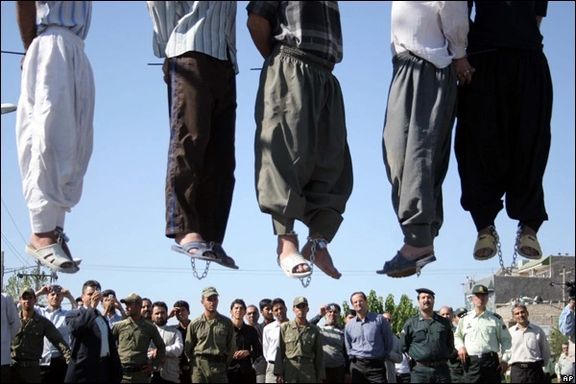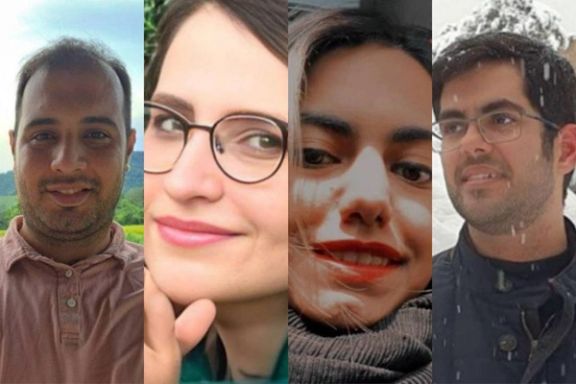Jailed Iranian Nobel Laureate To Stand Trial

Narges Mohammadi, a prominent human rights activist already spending her prison long time, is set to face a third trial on Tuesday in Tehran.

Narges Mohammadi, a prominent human rights activist already spending her prison long time, is set to face a third trial on Tuesday in Tehran.
Mohammadi was awarded the 2023 Nobel Peace Prize. The trial, scheduled in the Revolutionary Court, would focus on her human rights activities inside Tehran's Evin Prison.
Last week, after receiving the Nobel Peace Prize, Mohammadi was summoned to the women's ward office and notified that her trial would take place on December 19.
She has issued several statements from prison against the government. The Defenders of Human Rights Center confirms the news, describing the swift initiation of a new case following the Nobel Peace Prize ceremony as the regime's retaliation for her years of human rights advocacy.
The Center emphasizes, "The award has provided an unprecedented opportunity for the unheard voices and the realization of freedom and justice for political and ideological prisoners."
The Nobel Peace Prize ceremony on December 10 in Oslo, Norway, took place without Mohammadi's presence. Instead, her children, Ali and Kiana Rahmani, accepted the award on her behalf.
Close associates of Mohammadi reveal that since November 29, prison authorities have deprived her of phone calls and family visits. Over the past years, she has faced various charges related to her human rights activities, resulting in multiple arrests, trials, and approximately six years of imprisonment.
Her most recent arrest occurred in November 2021, leading to a cumulative sentence of 10 years and 9 months in prison, 154 lashes, a 4-month travel ban, street cleaning, and two cash fines in various cases.

The Iran Human Rights Organization (IHRNGO) has issued a report sounding the alarm about the rising threat of more executions in Iran coinciding with the Christmas holidays.
On Saturday, the organization based in Norway also reported that the execution of Samira Sabzian is expected to take place in the upcoming days. Initially scheduled for December 13, her execution for the alleged murder of her husband was deferred by a week. Samira, who was married as a child, has been on death row for a decade.
IHRNGO is calling on the public, civil society, and the international community to intervene and prevent the executions of Samira and other individuals on death row by engaging in anti-death penalty campaigns and political actions. Director Mahmood Amiry-Moghaddam expressed apprehension about the average of over four executions per day in the past week, stressing the need for the global community to speak out. He voiced concerns that, during the Christmas and New Year holidays, when many parts of the world are on vacation, more individuals may face the risk of execution.
“During this time, particularly individuals such as women, juvenile offenders, protesters, and political prisoners whose executions could elicit stronger reactions under normal circumstances are at greater risk.”
The Mizan news agency of Iran's notorious judiciary also announced the execution of an unnamed man on December 16 in Zahedan Central Prison, citing "links with foreign services, including Mossad." The timing of the execution, occurring a day after the armed attack on the Rask police headquarters, raises suspicions of it being retaliatory.
Iran Human Rights has documented a total of 31 executions between December 9 and December 16, 2023.

A Revolutionary Court in Tehran has handed down an 11-year prison sentence to Sajjad Iman-Nejad, one of the detainees from last year's anti-government protests.
According to the Human Rights Activists News Agency (HRANA), Iman-Nejad faces charges of "armed confrontation" and "intentional assault on law enforcement officers with a cold weapon."
In addition to the prison term, the court has mandated restitution, requiring Iman-Nejad to pay over 50,000 USD to seven law enforcement officers. The court session addressing the charges against the political prisoner took place on November 20 but the verdict became public Sunday.
HRANA, citing an informed source close to Iman-Nejad's family, reported that there are seven complainants by alleged victims, with three of them stating that Iman-Nejad did not assault them. The source further highlighted Iman-Nejad's health challenges, stating, "He is suffering from a disc herniation and physical problems. Despite being transferred to the hospital multiple times for treatment during his detention, he was told there were no available beds. Despite his serious need for treatment, he was returned to prison."
He was arrested on October 8, 2022, in connection with the Iranian uprising against the regime in Tehran. Currently detained in Evin Prison, Iman-Nejad, born in 1991 in Ardabil and residing in Tehran, is single and holds a bachelor's degree in architecture.

The action taken against an elderly man for dancing and singing in public has drawn media criticism of the Iranian government's crackdown on people's lifestyle choices.
“Why are you so upset by people’s happiness … Why are you so obsessed with [displaying] sorrow and tears [instead of happiness],” Fayaz Zahed, a sociology professor at Tehran University, asked the authorities in a commentary. “The [Iranian] society is tired, worn out, and sad. Let it be happy for a little while, even if [the feeling] is a lie, make-believe, and fleeting one.”
The spirited seventy-year-old man, Sadegh Bagheri, known locally as Sadegh the Trumpeter, has become a symbol of suppressed happiness and resistance against the regime's imposed lifestyle. Social media is flooded with videos of individuals, both young and old, mimicking his dance in solidarity.
A female fishmonger and her customers dancing in a market in Khuzestan
Dancing is considered debauchery by religious fundamentalists, categorizing it as wholly unacceptable behavior. After the Islamic Revolution, the term "synchronized movement" was introduced to replace the Arabic loanword "raqs," which had been used for centuries in Persian vernacular and literature to refer to dance.
The fundamentalist religious establishment, closely connected to political hardliners, strongly opposes most forms of music, especially lively pop music associated with dance. Consequently, dancing has become a form of protest against the regime, with families of government violence victims sharing dance videos on social media.
Accordingly, dancing has come to serve as a form of protest against the regime and families of the victims of government violence often post videos of their dancing on social media.
Video clip showing dancing and singing of victims of government violence
Zahed pointed out that Iranian society today is even sadder, more depressed, and in crisis than two decades ago when he previously wrote about the lack of happiness due to the authorities' lifestyle restrictions.
Earlier this month, Bagheri had a few thousand followers on Instagram. His followers are now increasing by the minute and have reached one million since Iran's Internet Police shut down his Instagram account for a few days for sharing less than a dozen videos of his happy dancing and singing.
One of these videos that showed him singing in his native Gilaki language outside his fishmonger’s shop at the fish market of Rasht, a northern Iranian coastal city had recently become very popular on social media.
People dancing in the fish market of Tonekabon in support of Bagheri
Authorities removed all content from Bagheri's page, along with a dozen other accounts sharing his videos, citing "criminal content" despite the absence of political or explicit lyrics in the songs. Reports suggested arrests, but Bagheri's page has since been restored, and he claims he was not arrested.
“We have done something that the dancing and singing of fishmongers has come to be considered an act of resistance [against the regime],” the conservative Farhikhtegan newspaper wrote Monday in an editorial entitled “How To Make Guerillas Out Of Singers” about the many dance videos constantly being made and posted on social media in defiance of the authorities. “Honestly, this is a feat!” the editorial said sarcastically.
“Those who shut down Sadegh Booghi’s account are not familiar with the [social] mechanism. They are happy that they have fulfilled their [religious] duty because they seem to think they have brought the representative of global imperialism to its knees in the Rasht market [by stopping the dancing].

In a continuation of the Iranian government’s crackdown against student activists, four individuals have received harsh penalties, including a total of eight years of suspension from their studies.
The development was disclosed by a student association on their Telegram channel, shedding light on the intricate details of the convictions imposed on the students.
Motahareh Gounei, a prominent student activist, has been handed a 24-month suspension, while her husband, Mehdi Hadizadeh, has been sentenced to a 12-month suspension from the university.
The judgments, issued by the authorities, involve the transfer of Gounei and Hadizadeh from Tehran University of Medical Sciences to Ardabil University of Medical Sciences.
The couple had previously faced detention during nationwide protests against the Islamic Republic. After a period of incarceration, they were subsequently released.
Kian Bani Hashemi and Fatemeh Gharibi have each been handed a significant two-and-a-half-year academic suspension. The verdict for the two students was issued by the Tehran University Disciplinary Council.
Since the commencement of the academic year in late September, disturbing reports have surfaced, detailing confrontations with students, expulsions, suspensions, and disciplinary committee sessions.
Furthermore, female students opposing mandatory hijab have received orders to cancel their residence in dormitories.
Last year, students from various universities across the country played a pivotal role in the uprising following the death in custody of Mahsa Amini. University campuses became hotbeds of student protests, sit-ins, and gatherings.
The student-led demonstrations persisted for several months, marked by the violent detention or exclusion of hundreds of students from various universities. Suppressive forces also carried out multiple attacks on student dormitories at various institutions of higher learning.

Iranians pressed a German mayor with ties to the Iranian city of Esfahan to use his leverage to secure the freedom of detained dissident rapper Toomaj Salehi.
The controversial mayor of the South-Western city of Freiburg, Martin Horn, has a twin city partnership with Esfahan (Isfahan), where Salehi is detained.
“The mayor of Freiburg, Martin Horn, can actually at least try to save an innocent life using the Isfahan-Freiburg city partnership. This partnership with a criminal regime shouldn’t have existed in the first place because Iran under the criminal Islamic Republic isn’t Iran anymore—it is an occupied country under a fanatic Islamic regime. But now Freiburg’s decision makers can show their seriousness about the importance of human rights and have Toomaj Salehi freed. Free Toomaj or end the partnership,” Sheina Vojoudi, an Iranian dissident in Germany, told Iran International on Saturday.
Iran International reported on Thursday that the Islamic Republic’s security forces violently assaulted Salehi during his arrest two weeks ago. Salehi, 33, was re-arrested on November 30 after being incarcerated for a year due to his support of the nationwide demonstrations against the regime last year.
Iranian security forces arrested around 22,000 people during the five-month-long protests after the death of 22-year-old Mahsa Amini in the custody of hijab police. But they particularly targeted artists, writers and journalists who sided with the anti-government protesters.
Vojoudi added that the international community gives Iran’s regime “legitimacy by ignoring the bad conditions of the Iranian political and religious prisoners like Toomaj Salehi but also rewards them with multiple partnerships. Democracies are demonstrating their weakness by turning a blind eye to the Islamic Republic’s crimes against humanity and ignoring western values.”
Aside from Iranian dissidents in Germany, as well as a small political party, JUPI, in Freiburg, opposed to the city partnership, there has been little German civil society resistance to Horn’s alleged pro-Iran regime policies.
Kazem Moussavi, who has campaigned for over twenty years against the dual city partnership, told Iran International, “It seems as if mayor Martin Horn and other Freiburg city officials have no empathy for the fact that Toomaj's life is in great danger. In Isfahan, people are repeatedly hanged on the gallows. The responsible governors of the Isfahan Revolutionary Guards are also helping Hamas, Hezbollah and Islamic Jihad to destroy Israel.”
Michael Blume, the German official in the state of Baden-Württemberg, where Freiburg is located, assigned to fight antisemitism, including Khamenei’s antisemitism, has lashed out at Iranian dissidents as “corrupt exiled nationalists.”
The German paper Die Welt reported on Wednesday that a second court decision affirmed that Blume can be called antisemitic due to his verbal attacks on German Jews.
Moussavi added “When it comes to this tragedy in Freiburg's twinning with Isfahan, Martin Horn and other people in charge of the city of Freiburg behave as if they were deaf, dumb and blind. A pity! Toomaj Salehi and all other political prisoners in Isfahan Prison must be released immediately.”